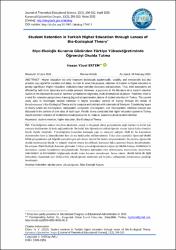| dc.contributor.author | Ertem, Hasan Yücel | |
| dc.date.accessioned | 2022-02-11T06:31:40Z | |
| dc.date.available | 2022-02-11T06:31:40Z | |
| dc.date.issued | 17.04.2020 | en_US |
| dc.identifier.citation | Ertem, H. Y. (2020). Student Retention in Turkish Higher Education through Lenses of Bio-ecological Theory . Journal of Theoretical Educational Science , 13 (2) , 296-310 . DOI: 10.30831/akukeg.576913 | en_US |
| dc.identifier.uri | https://dergipark.org.tr/tr/download/article-file/1038857 | |
| dc.identifier.uri | https://hdl.handle.net/11630/9918 | |
| dc.description.abstract | Higher education not only improves individuals academically, socially, and emotionally but also
provides any capital for societies and states. In order to serve this purpose, retention of students in higher education is
greatly significant. Higher education institutions have complex structures and processes. Thus, their ecosystems are
affected by both inner dynamics and outside pressure. However, a gap exists in the literature since student retention
studies in the literature focused on narrower perspectives neglecting multi-dimensional situations. Therefore, there is
a need for extensive perspectives drawing big and comprehensive picture of student retention in Turkey. The current
study aims to investigate student retention in higher education context of Turkey through the lenses of
Bronfenbrenner’s Bio-Ecological Theory and to compare and contrast with international literature. Considering layers
of theory which are microsystem, mesosystem, exosystem, macrosystem, and chronosystem, retention concept was
discussed in the context of core ideas of each layer. Finally, it was concluded that higher education system in Turkey
should consider inclusion of multidimensional approaches to create an awareness about student retention. | en_US |
| dc.description.abstract | : Yükseköğretim sadece bireylerin akademik, sosyal ve duygusal olarak gelişmelerine değil toplum ve devlet için
sermaye üretilmesine de katkı sağlamaktadır. Bu hedef için öğrencilerin yükseköğretim sistemi içinde kalıcı olmaları
büyük ölçüde önemlidir. Yükseköğretim kurumları karmaşık yapı ve süreçlere sahiptir. Öyle ki, bu kurumların
ekosistemleri hem iç dinamiklerden hem de dış baskılardan etkilenmektedir. Fakat alan yazındaki öğrenciyi okulda
tutma çalışmalarının çok boyutlu durumları göz ardı etmesi önemli bir boşluk oluşturmaktadır. Bu yüzden, öğrencinin
okulda tutulmasının büyük ve anlaşılır resmini ortaya koyabilecek kapsayıcı bakış açılarına ihtiyaç duyulmaktadır.
Bu çalışma, Biyo-Ekolojik Kuramın gözünden Türkiye yükseköğretimindeki öğrenciyi okulda tutmayı incelemeyi ve
uluslararası yazınla kıyaslamayı amaçlamaktadır. Kuramın katmanları olan mikrosistem, mezosistem, ekzosistem,
makrosistem ve kronosistem bağlamında okulda tutma kavramı tartışılmıştır. Sonuç olarak, okulda tutma ile ilgili
farkındalık oluşturmak için Türkiye'deki yükseköğretim sisteminin çok boyutlu yaklaşımları benimsemesi gerektiği
önerilmiştir | en_US |
| dc.language.iso | en | |
| dc.publisher | Afyon Kocatepe Üniversitesi | en_US |
| dc.relation.ispartof | Kuramsal Eğitimbilim Dergisi | |
| dc.identifier.doi | 10.30831/akukeg.576913 | |
| dc.rights | info:eu-repo/semantics/openAccess | en_US |
| dc.subject | Student Retention | en_US |
| dc.subject | Higher Education | en_US |
| dc.subject | Bio-Ecological Theory | en_US |
| dc.subject | Okulda Tutma | en_US |
| dc.subject | Yükseköğretim | en_US |
| dc.subject | Biyo-Ekolojik Kuram | en_US |
| dc.title | Student retention in Turkish higher education through lenses of bio-ecological theory | en_US |
| dc.title.alternative | Biyo-ekolojik kuramın gözünden Türkiye yükseköğretiminde öğrenciyi okulda tutma | en_US |
| dc.type | Article | |
| dc.department | Fakülteler, Eğitim Fakültesi, Eğitim Bilimleri Bölümü | en_US |
| dc.identifier.orcid | 0000-0001-9058-641X | en_US |
| dc.identifier.volume | 13 | en_US |
| dc.identifier.startpage | 296 | en_US |
| dc.identifier.endpage | 310 | en_US |
| dc.identifier.issue | 2 | en_US |
| dc.relation.publicationcategory | Makale - Ulusal Hakemli Dergi - Başka Kurum Yazarı | en_US |



















